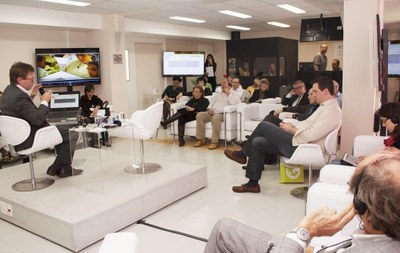Collegium de Lyon: advanced studies guided by scientific freedom
 The Collegium de Lyon stands in the scientific horizon of France as a center of innovative research by combining three key features: independence, interdisciplinarity and international openness.
The Collegium de Lyon stands in the scientific horizon of France as a center of innovative research by combining three key features: independence, interdisciplinarity and international openness.
The statement summarizes the main ideas presented in the international conference The Collegium de Lyon: A French Institute of Advanced Studies. At the event, held by IEA on May 10, Olivier Faron, the institution's president, spoke about particularities, operation, and objectives of the institute.
Founded in December 2006, the Collegium is the seat of the Réseau Français des Instituts d'Études Avancées (RFIEA), a network created by the French government in the same year and that brings together three other institutes for advanced studies in France: the Institut Méditerranéen de Recherches Avancées, the Institut d'Études Avancées de Nantes and the Institut d'Études Avancées de Paris.
The RFIEA is part of the University-Based Institutes for Advanced Study (Ubias), a network that brings together 33 institutes for advanced studies linked to universities around the world, including the IEA.
Autonomy
According to Faron, the central issue in the creation of the Collegium de Lyon was to define a specific concept of an institute for advanced studies in the midst of the work done by other French scientific organizations: ‘We came to the conclusion that there was a need of creating an innovative environment that enabled researchers to reach new areas of research and proceed with epistemological rupture’.
To make this possible, decisions about science policy of the institute were left in charge of an independent international scientific council. Faron emphasized two other factors for the creation of this environment: the opening of the institute to researchers around the world, including members of the council, and the interdisciplinary vocation, associated to freedom of choice of themes.
According to the speaker, when the Collegium began its activities, it was decided to draw research programs, defining themes of concentration. ‘We quickly realized that the schedule system was sterilizing and did not work’, he said, noting that this constituency did not contribute to attract the best researchers.
He highlighted that renowned scientists, capable of original results, only began to be interested in the institute when the fixed schedule was abandoned and replaced by thematic freedom, which gave room for the proposition of pioneering and interdisciplinary research projects.
Visitors
Visiting researchers can stay at the Collegium de Lyon for a sabbatical period of five or ten months, having the opportunity of devoting themselves entirely to research, without worrying about administrative obligations or others related to teaching.
The calls take place throughout the year, without too much bureaucracy, and are guided by academic excellence. According to Faron, ‘it is important to invite colleagues who have their own skills, who add value to the institute and generate relevant results’.
To ensure that this occurs, the scientific council follows four main selection criteria: the scientific quality of the project, the innovative aspects, expected results and expected impact considering the research profile of the Lyon region.
In addition, each visiting researcher has a local mentor who makes them get acquainted to the scientific landscape of Lyon and join their project with the ongoing research in the city.
Green Room
The conference conducted by the Collegium de Lyon’s president is part of the series of events organized by the IEA to promote a reflection on the role of institutes of advanced studies and to stimulate exchange between such institutions. These metacritical debates integrate the guidelines of the Intitutional Project 2012-2017 and are located in the Green Room of the institute's website.
The first event was held in 2011, when Peter Godard, Director of IAS Princeton, and Eliezer Rabinovici, Director of the Institute for Advanced Studies at the Hebrew University of Jerusalem, came to the IEA to talk about the operation of their institutes and the specificity of advanced studies.
In 2012 Aditya Mukherjee, Director of the Institute for Advanced Studies Jawaharlal Nehru, visited the IEA. At the meeting, he dealt with the origin and the academic profile of the institute as well as the university in which it is based.
The events have been intensified in 2013. Last February, Dapeng Cai and Susumu Saito, researchers at the Institute for Advanced Research of the Nagoya University, gave a presentation at the IEA on good practices for the development of high-level research adopted by their institute.
In April, Malcolm Press, Director of the Institute of Advanced Studies (IAS) of the University of Birmingham, visited the IEA to present the development process of the institute, the results of the first year of activities and expectations for the future.
